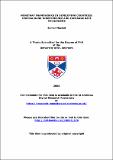Files in this item
Monetary frameworks in developing countries : central bank independence and exchange rate arrangements
Item metadata
| dc.contributor.advisor | Cobham, David | |
| dc.contributor.author | Maziad, Samar | |
| dc.coverage.spatial | 255 | en |
| dc.date.accessioned | 2008-05-14T13:14:15Z | |
| dc.date.available | 2008-05-14T13:14:15Z | |
| dc.date.issued | 2008-06 | |
| dc.identifier | uk.bl.ethos.552106 | |
| dc.identifier.uri | https://hdl.handle.net/10023/476 | |
| dc.description.abstract | The objective of the thesis was to study monetary policy frameworks in developing countries. The thesis focused on three aspects of the monetary framework; the degree of central bank independence, the monetary policy strategy and the exchange rate regime. The research applied quantitative empirical analysis and in-depth case studies on Egypt, Jordan and Lebanon. The empirical research investigated three areas: 1) the phenomenon of ‘fear of floating’ and the correlation between exchange rate and macroeconomic volatility; 2) the degree of monetary policy independence in developing countries in the context of their increased integration into the global economic system; and 3) the degree of central bank independence and how it impacts both ‘fear of floating’ and monetary policy independence. The case studies allowed for an in-depth understanding of the process of setting monetary policy and the constraints under which it is formulated in developing countries. The results that emerged from the quantitative analysis highlight the impact of central bank independence in influencing the other aspects of the monetary framework, as it can mitigate fear of floating and contribute to increased monetary policy independence of world interest rates in developing countries. The case studies detailed the evolution of monetary frameworks in three countries with varying degrees of central bank independence. The degree of central bank independence increased in Egypt and Jordan as a result of severe currency crises in each country, while Lebanon provides a very different example of a developing country with an independent central bank since its inception. The conclusions that emerged from the cases suggest that central bank independence is critical in achieving exchange rate and price stability; however, developing countries should avoid focusing on exchange rate stability at the expense of other considerations for extended periods of time. In that, the results point to the benefits of proactively and pre-emptively managing the exchange rate regime. The cases also highlight the importance of the coordination between fiscal and monetary policies, as conditions of fiscal profligacy can undermine even the most independent central bank. | en |
| dc.format.extent | 1338867 bytes | |
| dc.format.mimetype | application/pdf | |
| dc.language.iso | en | en |
| dc.publisher | University of St Andrews | |
| dc.subject | Central bank independence | en |
| dc.subject | Fear of floating | en |
| dc.subject | Monetary policy independence | en |
| dc.subject | Emerging markets | en |
| dc.subject.lcc | HG1496.M2 | |
| dc.subject.lcsh | Monetary policy--Developing countries | en |
| dc.subject.lcsh | Banks and banking, Central--Developing countries | en |
| dc.subject.lcsh | Foreign exchange rates--Developing countries | en |
| dc.title | Monetary frameworks in developing countries : central bank independence and exchange rate arrangements | en |
| dc.type | Thesis | en |
| dc.type.qualificationlevel | Doctoral | en |
| dc.type.qualificationname | PhD Doctor of Philosophy | en |
| dc.publisher.institution | The University of St Andrews | en |
This item appears in the following Collection(s)
Items in the St Andrews Research Repository are protected by copyright, with all rights reserved, unless otherwise indicated.

